山东省临沂市某重点中学2015-2016学年高二上学期12月月考英语试题
山东省临沂市某重点中学2015_2016学年高二英语12月月考试题

高二年级第二次月考英语试题第一部分:听力(共两节,满分30分)做题时,先将答案划在试卷上。
录音内容结束后,你将有两分钟的时间将试卷上的答案转涂到答题卡上。
第一节(共5小题;每小题1.5分,满分7.5分)听下面5段对话。
每段对话后有一个小题,从题中所给的A、B、C三个选项中选出最佳选项,并标在试卷的相应位置。
听完每段对话后,你都有10秒钟1. What will the woman do next?A. Tell the woman another joke.B. Look at her e-mail message.C. Think about the man’s words.2. How will the man help the woman?A. By cleaning the floor.B. By turning off the water.C. By washing the plates.3. What is the man’s problem?A. He can’t find the milk.B. He might overcharged.C. He took .the woman’s bill by mistake4. How many days does the woman plan to stay in New York in all?A. 21.B. 16.C. 6.5. Why does the man come to Austria?A. To have a holiday.B. To set up a branch office.C. To take a business travel . 第二节(共15小题;每小题1.5分,满分22.5分)听下面5段对话或独白。
每段对话或独白后有几个小题,从题中所给的A、B、C三个选项中选出最佳选项,并标在试卷的相应位置。
听每段对话或独白前,你将有时间阅读各个小题,每小题5秒钟;听完后,各小题将给出5秒钟的作答时间。
高二英语上学期期中卷临沂市某重点中学2015-2016学年高二上学期期中考试英语试题含答案
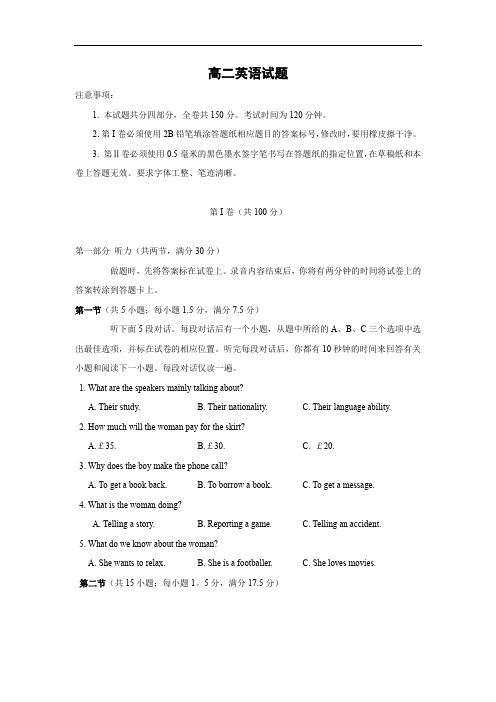
高二英语试题注意事项:1. 本试题共分四部分,全卷共150分。
考试时间为120分钟。
2.第I卷必须使用2B铅笔填涂答题纸相应题目的答案标号,修改时,要用橡皮擦干净。
3. 第Ⅱ卷必须使用0.5毫米的黑色墨水签字笔书写在答题纸的指定位置,在草稿纸和本卷上答题无效。
要求字体工整、笔迹清晰。
第I卷(共100分)第一部分听力(共两节,满分30分)做题时,先将答案标在试卷上。
录音内容结束后,你将有两分钟的时间将试卷上的答案转涂到答题卡上。
第一节(共5小题;每小题1.5分,满分7.5分)听下面5段对话。
每段对话后有一个小题,从题中所给的A、B、C三个选项中选出最佳选项,并标在试卷的相应位置。
听完每段对话后,你都有10秒钟的时间来回答有关小题和阅读下一小题。
每段对话仅读一遍。
1. What are the speakers mainly talking about?A. Their study.B. Their nationality.C. Their language ability.2. How much will the woman pay for the skirt?A.£35.B.£30.C. £20.3. Why does the boy make the phone call?A. To get a book back.B. To borrow a book.C. To get a message.4. What is the woman doing?A. Telling a story.B. Reporting a game.C. Telling an accident.5. What do we know about the woman?A. She wants to relax.B. She is a footballer.C. She loves movies.第二节(共15小题;每小题1。
山东省临沂市2015-2016学年高二上学期期末教学质量抽测英语试题 含答案
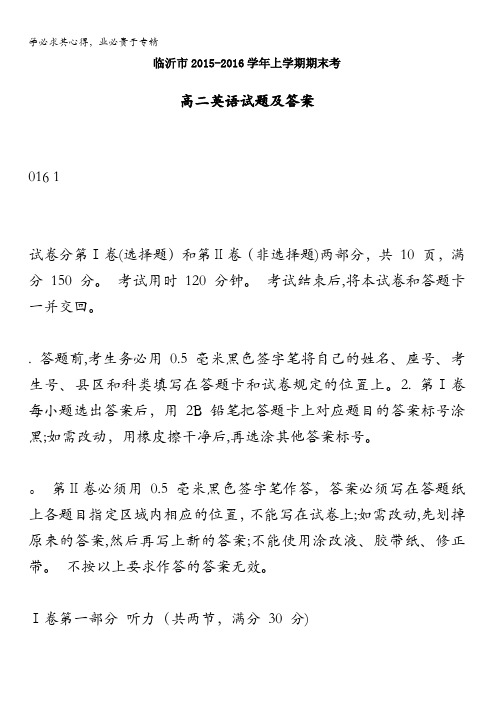
临沂市2015-2016学年上学期期末考高二英语试题及答案016 1试卷分第Ⅰ卷(选择题)和第Ⅱ卷(非选择题)两部分,共10 页,满分150 分。考试用时120 分钟。考试结束后,将本试卷和答题卡一并交回。. 答题前,考生务必用0.5 毫米黑色签字笔将自己的姓名、座号、考生号、县区和科类填写在答题卡和试卷规定的位置上。2. 第Ⅰ卷每小题选出答案后,用2B 铅笔把答题卡上对应题目的答案标号涂黑;如需改动,用橡皮擦干净后,再选涂其他答案标号。。
第Ⅱ卷必须用0.5 毫米黑色签字笔作答,答案必须写在答题纸上各题目指定区域内相应的位置,不能写在试卷上;如需改动,先划掉原来的答案,然后再写上新的答案;不能使用涂改液、胶带纸、修正带。不按以上要求作答的答案无效。Ⅰ卷第一部分听力(共两节,满分30 分)题时,先将答案标在试卷上。录音内容结束后,你将有两分钟的时间将试卷上的答案转涂到答题卡上。一节(共5 小题;每小题1。
5 分,满分7。
5 分)下面5 段对话。每段对话后有一个小题,从题中所给的A、B、C 三个选项中选出最佳选项,并标在试卷的相应位置。听完每段对话后,你都有10 秒钟的时间来回答有关小题和阅读下一小题。每段对话仅读一遍。。
What does the woman advise the man to do?. Change the order. B。
Telephone the seller。
C. Wait for some time.。
What does the man like doing?。
Gardening. B. Playing tennis. C。
Collecting stamps.。
Where will the woman most probably go?。
To a baker’s house. B. To a supermarket。
C。
To a bank。
.What’s the main reason for the man going to restaurants?. He wants to make new friends。
山东省临沂第一中学2015-2016学年高二6月月考英语试题 含答案

绝密★启用并使用完毕前高二阶段性考试试题英语2016、6本试卷分第I卷和第II卷两部分,共16页。
满分150分。
考试用时120分钟。
注意事项:1.答题前,考生务必将自己的姓名、准考证号填写在本试卷相应的位置。
2.全部答案在答题卡上完成,答在本试卷上无效.第I卷第一部分听力(共两节,满分30分)做题时,先将答案标在试卷上。
录音内容结束后,你将有两分钟的时间将试卷上的答案转涂到答题卡上。
第一节(共5小题;每小题1。
5分,满分7。
5分)听下面5段对话。
每段对话后有一个小题,从每题所给的A、B、C三个选项中选出最佳选项,并标在试卷的相应位置.听完每段对话后,你都有10秒钟的时间来回答有关小题和阅读下一小题。
每段对话仅读一遍。
例:How much is the shirt?A。
£19。
15. B. £9。
18. C. £9。
15.答案是C。
1.What does the woman want to do?A。
Find a place。
B。
Buy a map。
C. Get an address.2.What will the man do for the woman? A。
Repair her car.B。
Give her a ride. C。
Pick up her aunt。
3.Who might Mr. Peterson be?A。
A new professor。
1B.A department head.C.A company director.4.What does the man think of thebook? A. Quite difficult。
B。
Very interesting.C. Too simple。
5.What are the speakers talkingabout? A. Weather。
B。
Clothes。
C.News.第二节(共15小题;每小题1.5分,满分22.5分)听下面5段对话或独白。
山东省部分重点中学2016届高三第二次联考英语
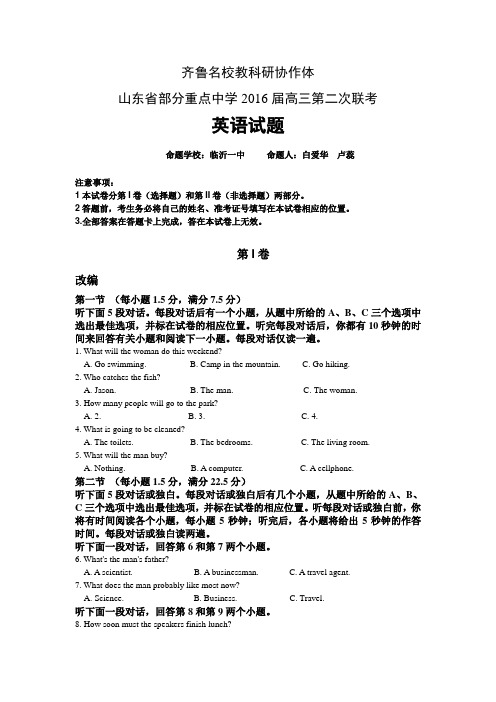
齐鲁名校教科研协作体山东省部分重点中学2016届高三第二次联考英语试题命题学校:临沂一中命题人:白爱华卢蕊注意事项:1本试卷分第I卷(选择题)和第II卷(非选择题)两部分。
2答题前,考生务必将自己的姓名、准考证号填写在本试卷相应的位置。
3.全部答案在答题卡上完成,答在本试卷上无效。
第I卷改编第一节(每小题1.5分,满分7.5分)听下面5段对话。
每段对话后有一个小题,从题中所给的A、B、C三个选项中选出最佳选项,并标在试卷的相应位置。
听完每段对话后,你都有10秒钟的时间来回答有关小题和阅读下一小题。
每段对话仅读一遍。
1. What will the woman do this weekend?A. Go swimming.B. Camp in the mountain.C. Go hiking.2. Who catches the fish?A. Jason.B. The man.C. The woman.3. How many people will go to the park?A. 2.B. 3.C. 4.4. What is going to be cleaned?A. The toilets.B. The bedrooms.C. The living room.5. What will the man buy?A. Nothing.B. A computer.C. A cellphone.第二节(每小题1.5分,满分22.5分)听下面5段对话或独白。
每段对话或独白后有几个小题,从题中所给的A、B、C三个选项中选出最佳选项,并标在试卷的相应位置。
听每段对话或独白前,你将有时间阅读各个小题,每小题5秒钟;听完后,各小题将给出5秒钟的作答时间。
每段对话或独白读两遍。
听下面一段对话,回答第6和第7两个小题。
6. What's the man's father?A. A scientist.B. A businessman.C. A travel agent.7. What does the man probably like most now?A. Science.B. Business.C. Travel.听下面一段对话,回答第8和第9两个小题。
【英语】山东省临沂第一中学2015-2016学年高二12月月考试题
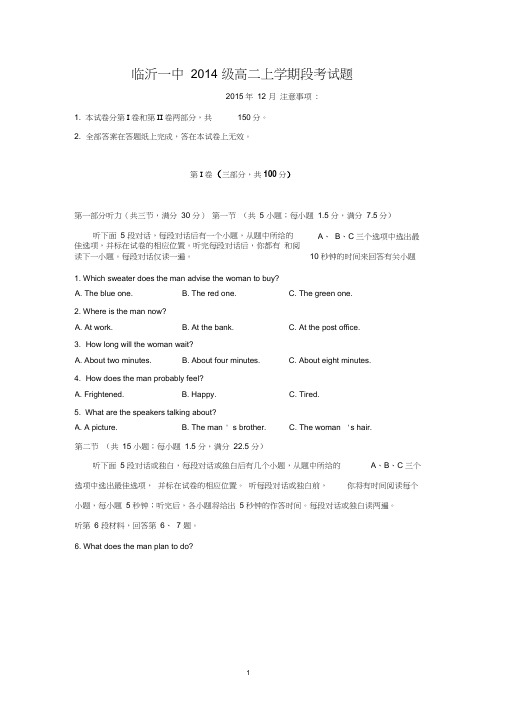
临沂一中2014 级高二上学期段考试题2015年12 月注意事项:1. 本试卷分第I卷和第II卷两部分,共150分。
2. 全部答案在答题纸上完成,答在本试卷上无效。
第I卷(三部分,共100分)第一部分听力(共三节,满分30 分)第一节(共 5 小题;每小题 1.5 分,满分7.5分)听下面 5 段对话,每段对话后有一个小题,从题中所给的佳选项,并标在试卷的相应位置。
听完每段对话后,你都有和阅读下一小题。
每段对话仅读一遍。
1. Which sweater does the man advise the woman to buy?2. Where is the man now?3. How long will the woman wait?4. How does the man probably feel?5. What are the speakers talking about?A、B、C 三个选项中选出最10 秒钟的时间来回答有关小题A. The blue one.B. The red one.C. The green one.A. At work.B. At the bank.C. At the post office.A. About two minutes.B. About four minutes.C. About eight minutes.A. Frightened.B. Happy.C. Tired.A. A picture.B. The man ' s brother.C. The woman 's hair.第二节(共15 小题;每小题 1.5 分,满分22.5 分)听下面 5 段对话或独白,每段对话或独白后有几个小题,从题中所给的A、B、C 三个选项中选出最佳选项,并标在试卷的相应位置。
听每段对话或独白前,你将有时间阅读每个小题,每小题 5 秒钟;听完后,各小题将给出 5 秒钟的作答时间。
山东省临沂市某重点中学2015-2016学年高二下学期第二次学情调研考试英语试题 含答案

高二下学期第二次学情调研考试英语试题第一部分听力(共两节,满分30分)做题时,先将答案标在试卷上。
录音内容结束后,你将有两分钟的时间将试卷上的答案转涂到答题卡上。
第一节(共5小题;每小题1。
5分,满分7。
5分)听下面5段对话。
每段对话后有一个小题,从题中所给的A、B、C三个选项中选出最佳选项,并标在试卷的相应位置。
听完每段对话后,你都有10秒钟的时间来回答有关小题和阅读下一小题。
每段对话仅读一遍。
1。
What happened to Lily?A. She broke her legs last week。
B. She broke her arm last week。
C. She lost her alarm clock last week。
2. How does the man arrive there?A。
By bicycle。
B. By bus. C。
On foot。
3. What does the woman mean?A。
Mary is healthier than she seems。
in good health。
C. Mary is in poor health like her。
4。
Where will the man go for the summer vacat A。
Tokyo. B。
C。
Kyoto5。
What are the speakers talking about?A. Their neighbour's dog. B。
Their neighboC. Their neighbour’s character。
第二节(共15小题;每小题1。
5分,满分22请听下面5段对话或独白。
每段对话或个小题,从题中所给出的A、B、C三个选项选项,并标在试卷的相应位置。
听每段对话你将有时间阅读各个小题,每小题5秒钟;小题将给出5秒钟的作答时间。
每段对话或独白读两遍。
听第6段材料,回答第6至7题。
山东省临沂市第十九中学2015-2016学年高二12月月考英语试题 Word版含答案.doc

冬学月中段学情调研考试英语试题一、听力(共两节, 满分20分)第一节(共5小题;每小题1分,满分5分)1. What does the man mean?A. They need to work harder.B. Most of the work remains to be done.C. The work is not as much as the woman thinks.2. Where is the man now?A. On the third floor.B. On the second floor.C. On the first floor.3. What do we know about the woman?A. She is drunk.B. She has been speeding.C. She drove through a red light.4. When will the two speakers probably discuss the agenda this evening?A. Before the dinner.B. During the dinner.C. After the dinner.5. What are the two speakers mainly talking about?A. Parks.B. Seasons.C. Kite-flying.第二节(共15 小题;每小题 1 分,满分15 分)听第6段材料,回答第6至7题。
6. What will the woman do this summer?A. Look for a job.B. Take a course and work.C. Travel around the world.7. When will the man think about his career?A. Before he graduates.B. After he finishes traveling.C. After he takes a business class.听第7段材料,回答第8至10题。
山东省临沂市某重点中学2015-2016学年高一上学期12月月考英语试题含答案
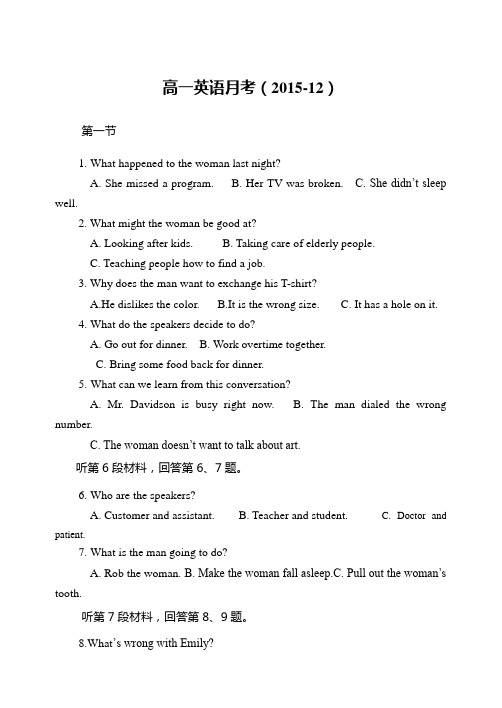
高一英语月考(2015-12)第一节1. What happened to the woman last night?A. She missed a program.B. Her TV was broken.C. She didn’t sleep well.2. What might the woman be good at?A. Looking after kids.B. Taking care of elderly people.C. Teaching people how to find a job.3. Why does the man want to exchange his T-shirt?A.He dislikes the color.B.It is the wrong size.C. It has a hole on it.4. What do the speakers decide to do?A. Go out for dinner.B. Work overtime together.C. Bring some food back for dinner.5.What can we learn from this conversation?A. Mr. Davidson is busy right now.B. The man dialed the wrong number.C. The woman doesn’t want to talk about art.听第6段材料,回答第6、7题。
6. Who are the speakers?A. Customer and assistant.B. Teacher and student.C. Doctor and patient.7. What is the man going to do?A. Rob the woman.B. Make the woman fall asleep.C. Pull out the woman’s tooth.听第7段材料,回答第8、9题。
(解析版)山东省临沂市重点中学2015-2016学年高二下学期六月月考英语试题

山东省临沂市重点中学2015-2016学年高二下学期六月月考英语试题2016-06-01 第一部分:听力(共两节,满分30分)第一节(共5小题;每小题1.5分,满分7.5分)1.What does Tom plan to do next week?A.To make a robotB.To enter a competition.C.To surprise the woman.2.What is the woman?A.A waitress.B.A tour guide.C.A saleswoman.3.What is the woman’s problom?A.She forgot her seat number.B.She got on the wrong train.C.She lost her train ticket.4.Why has the man stopped exercising?A.He is busy moving house.B.He lives far away from the gym.C.He dislikes going to gym alone.5.How is Janet probably feeling now?A.Disappointed.B.Confused.C.Stressed.第二节(共15小题;每小题1.5分,满分22.5分)听第6段材料,回答第6、7题。
6.How long is the woman going to stay at the hotel?A.Two nights.B.Three nights.C.Four nights.7.Why are the prices for the two rooms different?A.The rooms are different in size.B. The rooms have different views.C.The rooms are of different shapes.听第7段材料,回答第8、9题。
山东省临沂市某重点中学高二英语12月月考 理 新人教版

高二英语理科试题2013, 12本试卷分第Ⅰ卷(选择题)和第Ⅱ卷(非选择题)两部分,共150分。
考试时间120分钟。
说明: 1. 1—60小题在答题卡上把正确答案的标号涂黑。
61-70需写在二卷答题区。
2.考试结束后,只交第二卷和答题卡。
注意事项:1.答第1卷前,考生务必将自己的姓名、准考证号、考试科目涂写在答题卡上。
2.每小题选出答案后,用铅笔把答题卡上对应题目的答案标号涂黑。
如需改动,用橡皮擦干净后,再选涂其他答案标号。
在试卷上作答无效。
3.考试结束后考生将本试卷II 卷和答题卡一并交回。
第I卷(三部分,共75分)第一部分听力(三节,满分20分)做题时,先将答案标在试卷上。
录音内容结束后,你将有两分钟的时间将试卷上的答案转涂在答题卡上。
第一节(共5小题;每小题1分,满分5分)听下面5段对话。
每段对话后有一小题,从题中所给的A、B、C三个选项中选出最佳选项,并标在试卷的相应位置。
听完每段对话后,你都有10秒钟的时间来回答有关小题和阅读下一小题。
每段对话仅读一遍。
1. Why are Ted and Tyler still there?A. They planned to stay there for another day.B. The weather had kept them there.C. They were too busy to leave yesterday.2. What does the man take finally?A. The blue tie.B. Both ties.C. The yellow tie.3. What is Jenny learning to use?A. A washing machine. B A public telephone. C. A copying machine.4. What is the total cost of the two tickets?A. 90 yuan.B. 125 yuan.C. 135 yuan.5. What can we learn from the conversation?A. The man likes football very much.B. The man doesn’t like basketball.C. The man will be too busy this afternoon.第二节(共5小题;每小题 1 分,满分 5 分)听下面2 段对话或独白。
【英语】山东省临沂市某重点中学2015-2016学年高一下学期第二次月考
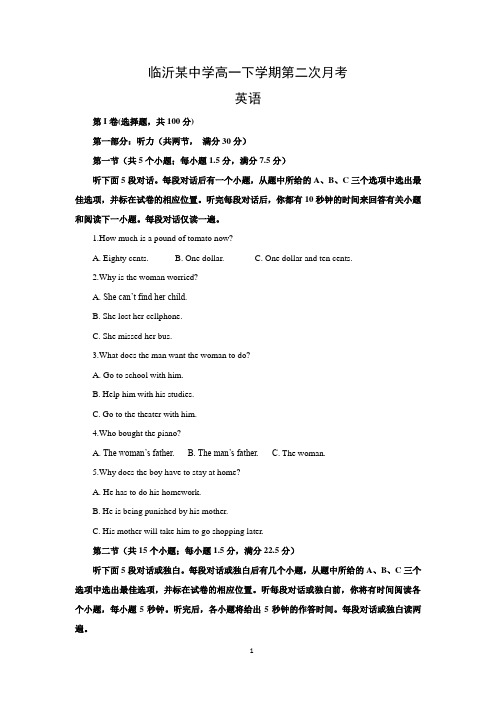
临沂某中学高一下学期第二次月考英语第I卷(选择题,共100分)第一部分:听力(共两节,满分30分)第一节(共5个小题;每小题1.5分,满分7.5分)听下面5段对话。
每段对话后有一个小题,从题中所给的A、B、C三个选项中选出最佳选项,并标在试卷的相应位置。
听完每段对话后,你都有10秒钟的时间来回答有关小题和阅读下一小题。
每段对话仅读一遍。
1.How much is a pound of tomato now?A. Eighty cents.B. One dollar.C. One dollar and ten cents.2.Why is the woman worried?A. She can’t find her child.B. She lost her cellphone.C. She missed her bus.3.What does the man want the woman to do?A. Go to school with him.B. Help him with his studies.C. Go to the theater with him.4.Who bought the piano?A. The woman’s father.B.The man’s father.C. The woman.5.Why does the boy have to stay at home?A. He has to do his homework.B. He is being punished by his mother.C. His mother will take him to go shopping later.第二节(共15个小题;每小题1.5分,满分22.5分)听下面5段对话或独白。
每段对话或独白后有几个小题,从题中所给的A、B、C三个选项中选出最佳选项,并标在试卷的相应位置。
听每段对话或独白前,你将有时间阅读各个小题,每小题5秒钟。
山东省临沂市某重点中学2015-2016学年高二上学期第一次(10月)月考英语试题含答案

2015级高二月考英语试题(2015.10)第Ⅰ卷第一部分听力(共两节,满分20分)1. How long has the man been a singer?A. For about ten years.B. For about twenty years.C. For over twenty years.2.What does the man think the woman should do?A. Make a phone call some ot her time.B. Borrow Mary’s cellphone.C. Use the cellphone.3. What may the woman have visited?A. Theatres.B. Museums.C. Playgrouds.4. What are the two speakers mainly talking about?A. Things to do today.B. An appointment.C. A new house.5. What are missing?A. An iPad mini and a cellphone.B. A cellphone and two credit cards.C. An iPad mini and two credit cards.听第6段材料,回答第6、7题。
6. Why does the man most probably come here ?A. To go sight-seeing.B. To visit the woman.C. To go on a business trip.7. How did the man get there?A. By air.B. By train.C. By car.听第7段材料,回答第8,9题。
8. Why does the man call?A. To ask if the woman is OK.B. To tell about a natural disaster.C. To tell her about his delayed flight.9. What has the storm led to?A. Some deaths and great damageB. Two injuries and great damage.C. Two deaths and eight injuries.听第8段材料,回答第10至12题。
山东省临沂市某重点中学高二英语上学期12月月考试题 文

高二英语月考试题(文科)第I卷(共95分)第一部分:听力 (共两节,满分30分)第一节(共5小题;每小题1.5分,满分7.5分)听下面5段对话。
每段对话后有一个小题,从题中所给的A、B、C三个选项中选出最佳选项,并标在试卷的相应位置。
听完每段对话后,你都有10秒钟的时间来回答有关小题和阅读下一小题。
每段对话仅读一遍。
例:How much is the shirt?A. £19.15.B. £9.18.C. £9.15.答案是 C。
1. What does the woman want to do?A. Find a place.B. Buy a map.C. Get an address.2. What will the man do for the woman?A. Repair her car.B. Give her a ride.C. Pick up her aunt.3. Who might Mr. Peterson be?A. A new professor.B. A department head.C. A company director.4. What does the man think of the book?A. Quite difficult.B. Very interesting.C. Too simple.5. What are the speakers talking about?A. Weather.B. Clothes.C. News.第二节(共15小题;每小题1.5分,满分22.5分)听下面5段对话或独白。
每段对话或独白后有几个小题,从题中所给的A、B、C三个选项中选出最佳选项,并标在试卷的相应位置。
听每段对话或独白前,你将有时间阅读各个小题,每小题5秒钟;听完后,各小题给出5秒钟的作答时间。
每段对话或独白读两遍。
听第6段材料,回答第6、7题。
6. Why is Harry unwilling to join the woman?A. He has a pain in his knee.B. He wants to watch TV.C. He is too lazy.7. What will the woman probably do next?A. Stay at home.B. Take Harry to hospital.C. Do some exercise.听第7段材料,回答第8、9题。
山东省临沂市重点中学2015-2016学年高二下学期六月月考英语试题 含解析

山东省临沂市重点中学2015-2016学年高二下学期六月月考英语试题2016—06—01 第一部分:听力(共两节,满分30分)第一节(共5小题;每小题1。
5分,满分7。
5分)1.What does Tom plan to do next week?A。
To make a robot B。
To enter a competition。
C。
To surprise the woman。
2.What is the woman?A。
A waitress。
B。
A tour guide. C。
A saleswoman.3。
What is the woman’s problom?A。
She forgot her seat number。
B.She got on the wrong train.C。
She lost her train ticket。
4.Why has the man stopped exercising?A。
He is busy moving house。
B。
He lives far away from the gym。
C.He dislikes going to gym alone.5.How is Janet probably feeling now?A。
Disappointed. B。
Confused. C.Stressed。
第二节(共15小题;每小题1.5分,满分22.5分)听第6段材料,回答第6、7题。
6.How long is the woman going to stay at the hotel?A.Two nights。
B。
Three nights。
C.Four nights。
7。
Why are the prices for the two rooms different?A。
The rooms are different in size。
B. The rooms have different views。
高二英语月考试题及答案-临沂市某重点中学-学年高二12月月考44
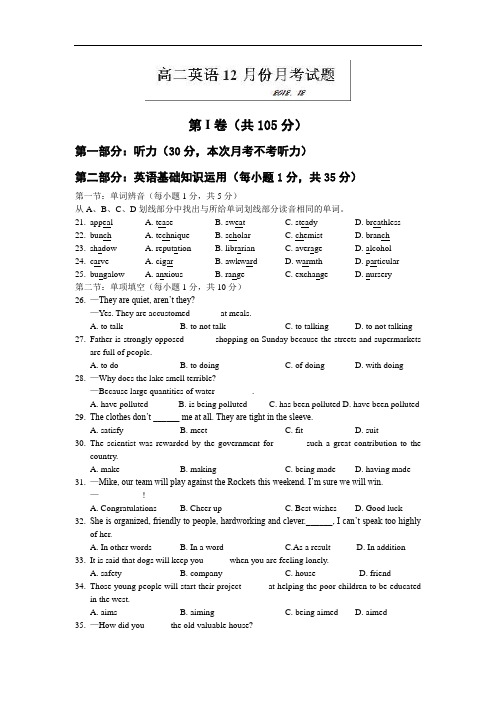
第I卷(共105分)第一部分:听力(30分,本次月考不考听力)第二部分:英语基础知识运用(每小题1分,共35分)第一节:单词辨音(每小题1分,共5分)从A、B、C、D划线部分中找出与所给单词划线部分读音相同的单词。
21.appeal A. tease B. sweat C. steady D. breathless22.bunch A. technique B. scholar C. chemist D. branch23.shadow A. reputation B. librarian C. average D. alcohol24.carve A. cigar B. awkward D. warmth D. particular25.bungalow A. anxious B. range C. exchange D. nursery第二节:单项填空(每小题1分,共10分)26.—They are quiet, aren’t they?—Yes. They are accustomed ______ at meals.A. to talkB. to not talkC. to talkingD. to not talking27.Father is strongly opposed ______ shopping on Sunday because the streets and supermarketsare full of people.A. to doB. to doingC. of doingD. with doing28.—Why does the lake smell terrible?—Because large quantities of water ________.A. have pollutedB. is being pollutedC. has been pollutedD. have been polluted29.The clothes don’t ______ me at all. They are tight in the sleeve.A. satisfyB. meetC. fitD. suit30.The scientist was rewarded by the government for ______ such a great contribution to thecountry.A. makeB. makingC. being madeD. having made31.—Mike, our team will play against the Rockets this weekend. I’m sure we will win.—__________!A. CongratulationsB. Cheer upC. Best wishesD. Good luck32.She is organized, friendly to people, hardworking and clever.______, I can’t speak too highlyof her.A. In other wordsB. In a wordC.As a resultD. In addition33.It is said that dogs will keep you _____ when you are feeling lonely.A. safetyB. companyC. houseD. friend34.Those young people will start their project _____ at helping the poor children to be educatedin the west.A. aimsB. aimingC. being aimedD. aimed35.—How did you _____ the old valuable house?—It used to be ______ my uncle. He left it to me in his will.(遗嘱)A. take possession of; in possession ofB. take the possession of; in the possession ofC. take possession of; in the possession ofD. take the possession of; in possession of第三节:完形填空(每小题1分,共20分)We should show respect to everybody, especially our elders because they are ahead of us —in age, in wisdom and maturity, in experience and education. Our 36 have done a lot for us, directly or indirectly and most of us 37 everything to their kindness and love.When we 38 them respect, whether it is by bowing to them, or 39 them with a smile, or offering them any help they need, it is one way of 40 our own love and gratitude to them. 41 , elders have also been through all the years you are 42 and know a little more about the world than you do.It is 43 that you do not agree with the belief of your elders, but this is nothing new. All younger generations have always 44 with their elders and it is these differences that bring changes in human 45 . However much you disagree with them, give them credit for their 46 .With changing times and 47 influences, youngsters no longer know what is interpreted (被解读)as disrespect to elders. Youngsters should 48 express their views and if there are arguments, they should not 49 their voices.If there is no space on sofas or chairs, children will immediately 50 their places, and sit on the carpet. In buses and trains, youngsters are 51 to give up their places to older people. This is not a 52 of who has more rights. It is simply that those who are younger have the strength to bear 53 , or tolerate unpleasantness, so it is natural to show consideration to those who are older and perhaps at a 54 disadvantage.When you do simple things as a mark of respect, elders become 55 that youngsters care for them, and they respond with affection and kindness.36. A. youngsters B. elders C. parents D. juniors37. A. devote B. owe C. pay D. contribute38. A. show B. explain C. exhibit D. point39. A. greeting B. receiving C. declaring D. showing40. A. expressing B. describing C. sending D. suggesting41. A. However B.Therefore C.Besides D. Though42. A. experiencing with B. going through C. suffering from D. worrying out43. A. maybe B. likely C. possible D. probably44. A .quarreled B. dealt C. lived D. disagreed45. A. community B. organization C. society D. public46. A. experience B. reality C. emotion D. information47. A. cultural B. special C. environmental D. position48. A. quietly B. slightly C. silently D. coldly49. A. rise B. raise C. support D. force50. A. give away B. get rid of C. give up D. send out51. A. expected B. forced C. needed D. reminded52. A. doubt B. question C. wonder D. challenge53. A. suffering B. upset C. trouble D. discomfort54. A. serious B. light C. heavy D. slight55. A. aware B. alive C. knowing D. sensible第三部分:阅读理解(每小题2分,共40分)AEverybody has one of those days when everything goes wrong. This is what happened to Harry.He got up one morning very late because he had forgotten to wind up his alarm clock(闹钟). He tried to shave(刮脸)quickly and cut himself. When he got dressed he got blood all over his clean shirt, so he had to find another one. The only other shirt that was clean needed ironing(熨), so he ironed it. While he was ironing it, there was a knock at the door. It was the man to read the electricity meter(表). He showed him where the meter was, said good-bye and found that the iron had burnt a hole in his shirt. So he had to wear the one with the blood on it after all. By this time it was very late, so he decided he couldn’t go to work by bus. He telephoned for a taxi to take him to work. The taxi arrived and Harry got in and began to read the newspaper.In another part of the town, a man had killed a woman with a knife and was seen to run away in a taxi. When Harry’s taxi stopped outside his office, a policeman happened to be standing there. He saw the blood on Harry’s shirt, and took him to the police station. He was kept till 3 o’clock in the afternoon before the police were sure that he was not the man they wanted. When he finally arrived at the office at about four, his boss took a look at him and told him to go away and find another job.56. Harry had.A. a lucky dayB. an unlucky dayC. a busy dayD. a good day57. Put the following sentences into correct order according to the passage.a. The man who read the electricity meter came.b. Harry ironed his shirt.c. Harry got blood all over his clean shirt.d. There was a knock at the door.e. Harry wore the shirt with blood on it.A. a, b, c, d, eB. b, a, d, c, eC. b, a, c, d, eD. c, b, d, a, e58. Why did Harry wear the shirt with blood on it?A. The iron had burnt a hole in his clean shirt.B. The only other needed ironing.C. He had only one shirt.D. He cut himself and got blood all over his shirt.59. Harry was taken to the police station because.A. his taxi stopped outside his office and a policeman happened to be thereB. there was blood on his shirt and he was in a taxiC. a man killed a woman with a knifeD. the murdererwas seen to run away in a taxi60. His boss told him to go away and find another job because.A. he had been kept by the policeB. there was blood on his shirtC. he was late for workD. he had killed a womanBThe British policeman has several nicknames , but the most frequently used are “copper” and “bobby”. The first name comes from the verb “cop” meaning “ to take” or “capture”, and thesecond comes from the first name of Sir Robert Peel, a 19th century politician, who was the founder of the police force. An early nickname for the policemen was “peeler”, but this name has died out. \Visitors to England seem, nearly always, to be very impressed by the English police. In fact, it has become a joke that the visitors to Britain, when asked for his views of the country, will always say, at some point or other, “I think your policemen are wonderful.”Well, the British bobby may not always be wonderful but he is usually a very friendly and helpful character.A music-hall song of some years ago was called, “If you want to know the time, ask a policeman.” Nowadays, most people own watches but they still seem to find plenty of othe r questions to ask the policeman. In London, the policemen spend so much of their time directing visitors about city that one wonders how they ever find time to do anything else!61. _________ nicknames for the British policeman have been mentioned in the passage.A. TwoB. ThreeC.SeveralD. Many62. One of the nicknames for the policeman “peeler” _________.A. is most frequently usedB. has not been used any moreC. was Sir Robert Peel’sD. is still used as m uch as “ bobby”63. The main idea of the second paragraph is that ________.A. visitors to England are kind to the British policemenB. the English policemen have become a joke to visitorsC. visitors to Britain are very grateful to the policemen for their helpD. the British policemen tell the visitors the views of their country64. “If you want to know the time, ask a policeman.”This means _______.A.the British policemen like to tell the time to the visitorsB.most people’s watches don’t go w ellC.the British policemen are friendly and helpfulD.the British policemen know the time correctly65. From the whole passage, we know that __________.A.the British policemen spend a lot of time directing the visitors in EnglandB.the British policemen’s nicknames may not always be wonderfulC.the British policemen can’t find any time to do anything else but help the visitors all dayD.the British policemen’s nicknames have died out.CSydney— Mobile phone has become a problem for middle schools. Some middle schools in Australia have banned(禁止)students from carrying mobile phones during school hours.Mobile phone use among children has become a problem for the school this year. Several children have got mobile phones as Christmas gifts, and more students want them.Mary Bluett, an official, said mobile phone use is a distraction(分心)to students during school hours and it also gives teachers so much trouble in their classrooms. Teachers were also saying that sometimes students might use phone messages to cheat during exams.She said some schools had tried to ban mobile phones. Some parents felt unhappy because they couldn’t get in touch with their children.Many teachers said students should not have mobile phones at school, but if there was a good reason, they could leave their phones at school offices. They also said there were many reasons why the students should not have mobile phones at school: they were easy to lose and were a distraction from studies.Many people say that they understand why parents would want their children to have phones, but they think schools should let the students know when they can use their mobile phones.66. Some middle schools in Australia have banned students from carrying mobile phones ____.A. because they are studentsB. when they are freeC. because they are youngD. when they are at school67. Some parents felt unhappy because they couldn’t during school hours.A. get in touch with their childrenB. leave their mobile phonesC. help the teachers with their workD. use their mobile phones68. We know from the passage that some children get mobile phones from ____________.A. the makers and sellersB. some other strangersC. their parents and friendsD. some mobile phone users69. The underlined word “they” in th e fifth paragraph refers to ____________.A. many teachersB. mobile phonesC. some messagesD. some students70. The topic mainly talked about in the text is ____________.A. when the students of some Australian schools can use their mobile phonesB. why the students should not use mobile phones in some Australian schoolsC. whether the Australian students can have mobile phones at schoolD. how some parents feel when their children should not carry mobile phonesDDick was a twenty-year-old man. His father was a teacher and taught chemistry in a middle school and his mother worked in a shop. They lived a happy life until his parents died one night when suddenly an earthquake broke out. Luckily his sister took him to see their aunt in the city and they did not stay at home. Everything was destroyed in the earthquake and the two children got into trouble. Thanks to their aunt who was not rich enough, they grew up but they lived a hard life. His sister was so sad that she became a nun (修女). After he finished middle school, he was introduced to an owner of a hotel and began to work there.One day the young man fell to the ground while he was cleaning a window on the second floor. He was sent to the hospital and the doctor looked him over. One of his legs was broken and he had to be in hospital. He said to the nurse, “I’m a poor man, madam. Arrange a third-class ward (病房) for me, please.”“Can’t anybody help you?”“No, madam,” answered Dick. “I have only a sister. She’s a nun and she’s poor, too.”“I don’t think so,” the nurse said angrily. “Nuns usually marry God. And God is the richest in the world, you know!”“Well, then,” Dick said with a smile. “Please arrange a first-class ward for me and post the bill (账单) to my brother-in-law.”71. Dick’s parents died ______.A. in an accidentB. in the warC. from the diseaseD. in the earthquake72. Dick and his sister escaped from the earthquake because ______.A. they played outsideB. they were in a safe placeC. their parents saved themD. the aunt saved them73. The sister and brother lived a hard life because ______.A. they lost all in the earthquakeB. they were too youngC. they were hurt in the earthquakeD. they had to look after themselves74. After Dick finished middle school, ______.A. he stayed at homeB. he began to work in the hotelC. he began to look for a jobD. he broke his leg75. Which of the following is true?A. The nurse would arrange a first-class ward for Dick.B. The nurse would post Dick’s bill to God.C. The nurse would arrange a third-class ward for Dick.D. Dick had a rich brother-in-law.第II卷(共45分)第一节:阅读表达(共15分)People who drink a little, exercise, quit smoking and eat five servings of fruit and vegetables each day live on average 14 years longer than people who adopt none of these behaviors, researchers said on Tuesday. A collection of evidence has shown that these things contribute to healthier and longer lives, but the new study actually qualified their mixed effect, the British team said.“These results may provide further support for the idea that even small differences in lifestyle may make a big difference to health, ” the researchers wrote in the journal PLOS Medicine.Between 1993 and 1997 the researchers questioned 20, 000 healthy British men and woman about their lifestyles. They also tested every participant’s blood to measure vitamin C in take. an indicator(指标)of how much fruit and vegetables people ate.Then they assigned the participants-aged 45-79 a score of between 0 and 4, giving one point for each of the healthy behaviors. After allowing for age and other factors that could affect the likelihood of dying.the researchers found people with a score of 0 four times as likely to die.The researchers, who tracked deaths among the participants until 2006, also said a person with a health score of 0 had the same risk of dying as someone with score of 4 who was 14 years older.The lifestyle change with the biggest benefit was _____________________ ,which led to an 80 percent improvement in health.the study found.This was followed by eating fruits and vegetables. Drinking a little and keeping active brought the same benefits,Kay-Tee Khaw at the University of Cambridge said. Do you have the four healthy living habits?1.What is the best title of the passage?(within 10 words)___________________________________________________________________________2.Which sentence in the passage is the closest in meaning to the following one?It is well known that each living habit is good for health,but now the study has made it clear how nice the four habits cooperate.___________________________________________________________________________3.Fill in the blank in the last paragraph with a proper sentences.(within 10 words)___________________________________________________________________________4.What should be encouraged according to the result of the research?(within 10 words)___________________________________________________________________________5.Translate the underlined sentence in Paragraph 2 into Chinese.___________________________________________________________________________ 第二节:书面表达(满分30分)你的英国朋友Tom通过电子邮件想知道你校最近举行的各种活动,你把最近你校举办的注意:1.词数:120--150词;2.可适当加入细节,以使行文连贯;3. 电子邮件的开头已为你写好(不计入总词数)。
山东省临沂市某重点中学高二英语上学期12月月考试题 理
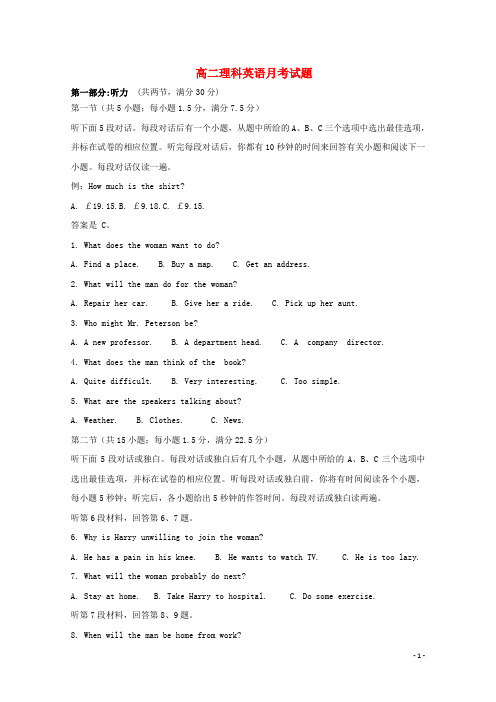
高二理科英语月考试题第一部分:听力 (共两节,满分30分)第一节(共5小题;每小题1.5分,满分7.5分)听下面5段对话。
每段对话后有一个小题,从题中所给的A、B、C三个选项中选出最佳选项,并标在试卷的相应位置。
听完每段对话后,你都有10秒钟的时间来回答有关小题和阅读下一小题。
每段对话仅读一遍。
例:How much is the shirt?A. £19.15.B. £9.18.C. £9.15.答案是 C。
1. What does the woman want to do?A. Find a place.B. Buy a map.C. Get an address.2. What will the man do for the woman?A. Repair her car.B. Give her a ride.C. Pick up her aunt.3. Who might Mr. Peterson be?A. A new professor.B. A department head.C. A company director.4. What does the man think of the book?A. Quite difficult.B. Very interesting.C. Too simple.5. What are the speakers talking about?A. Weather.B. Clothes.C. News.第二节(共15小题;每小题1.5分,满分22.5分)听下面5段对话或独白。
每段对话或独白后有几个小题,从题中所给的A、B、C三个选项中选出最佳选项,并标在试卷的相应位置。
听每段对话或独白前,你将有时间阅读各个小题,每小题5秒钟;听完后,各小题给出5秒钟的作答时间。
每段对话或独白读两遍。
听第6段材料,回答第6、7题。
6. Why is Harry unwilling to join the woman?A. He has a pain in his knee.B. He wants to watch TV.C. He is too lazy.7. What will the woman probably do next?A. Stay at home.B. Take Harry to hospital.C. Do some exercise.听第7段材料,回答第8、9题。
高二英语月考试题及答案-临沂市第十八中2015-2016学年高二下学期第一次月考试题
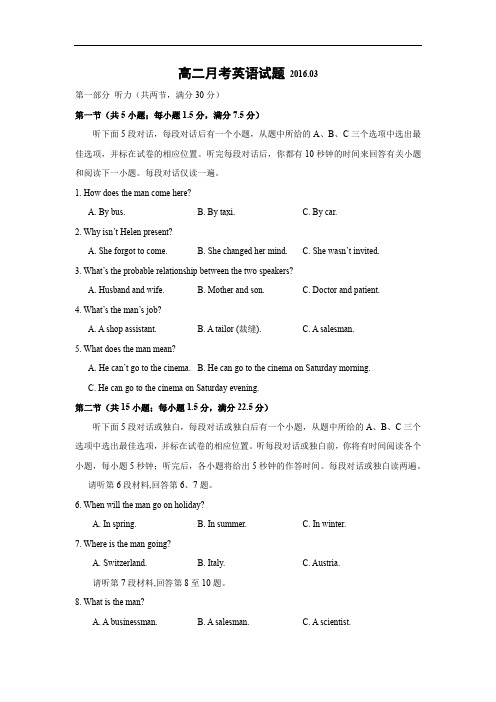
高二月考英语试题2016.03第一部分听力(共两节,满分30分)第一节(共5小题;每小题1.5分,满分7.5分)听下面5段对话,每段对话后有一个小题,从题中所给的A、B、C三个选项中选出最佳选项,并标在试卷的相应位置。
听完每段对话后,你都有10秒钟的时间来回答有关小题和阅读下一小题。
每段对话仅读一遍。
1. How does the man come here?A. By bus.B. By taxi.C. By car.2. Why isn’t Helen present?A. She forgot to come.B. She changed her mind.C. She wasn’t invited.3. What’s the probable relationship between the two speakers?A. Husband and wife.B. Mother and son.C. Doctor and patient.4. What’s the man’s job?A. A shop assistant.B. A tailor (裁缝).C. A salesman.5. What does the man mean?A. He can’t go to the cinema.B. He can go to the cinema on Saturday morning.C. He can go to the cinema on Saturday evening.第二节(共15小题;每小题1.5分,满分22.5分)听下面5段对话或独白,每段对话或独白后有一个小题,从题中所给的A、B、C三个选项中选出最佳选项,并标在试卷的相应位置。
听每段对话或独白前,你将有时间阅读各个小题,每小题5秒钟;听完后,各小题将给出5秒钟的作答时间。
每段对话或独白读两遍。
请听第6段材料,回答第6、7题。
- 1、下载文档前请自行甄别文档内容的完整性,平台不提供额外的编辑、内容补充、找答案等附加服务。
- 2、"仅部分预览"的文档,不可在线预览部分如存在完整性等问题,可反馈申请退款(可完整预览的文档不适用该条件!)。
- 3、如文档侵犯您的权益,请联系客服反馈,我们会尽快为您处理(人工客服工作时间:9:00-18:30)。
高二年级第二次月考英语试题2015.12★祝考试顺利★第一部分:听力(共两节,满分30分)做题时,先将答案划在试卷上。
录音内容结束后,你将有两分钟的时间将试卷上的答案转涂到答题卡上。
第一节(共5小题;每小题1.5分,满分7.5分)听下面5段对话。
每段对话后有一个小题,从题中所给的A、B、C三个选项中选出最佳选项,并标在试卷的相应位置。
听完每段对话后,你都有10秒钟1. What will the woman do next?A. Tell the woman another joke.B. Look at her e-mail message.C. Think about the man’s words.2. How will the man help the woman?A. By cleaning the floor.B. By turning off the water.C. By washing the plates.3. What is the man’s problem?A. He can’t find the milk.B. He might overcharged.C. He took .the woman’s bill by mistake4. How many days does the woman plan to stay in New York in all?A. 21.B. 16.C. 6.5. Why does the man come to Austria?A. To have a holiday.B. To set up a branch office.C. To take a business travel .第二节(共15小题;每小题1.5分,满分22.5分)听下面5段对话或独白。
每段对话或独白后有几个小题,从题中所给的A、B、C三个选项中选出最佳选项,并标在试卷的相应位置。
听每段对话或独白前,你将有时间阅读各个小题,每小题5秒钟;听完后,各小题将给出5秒钟的作答时间。
每段对话或独白读两遍。
听第6段材料,回答第6、7题。
6. What is the conversation mainly about?A. A photo.B. A party.C. A hat.7. What is the relationship between the speakers?A. Boss and worker.B. Mother and son.C. Teacher and student.听第7段材料,回答第8、9题。
8. What will the woman major in?A. Business administration.B. Medical science.C. Wildlife science.9. What did the woman’s mother give to her?A. A credit card.B. A dress.C. A book.听第8段材料,回答第10至12题。
10. On which day will the barbecue be held?A. On Wednesday.B. On Thursday.C. On Saturday.11. What music will the band play?A. Hip hop.B. Jazz.C. Rock.12. Where will the barbecue take place?A. On the sports field.B. In the garden.C. By the pool.听第9段材料,回答第13至16题。
13. How long does the full-day trip last?A. About 4 hours.B. About 7 hours.C. About 9 hours.14. What does the woman think of skydiving?A. Expensive.B. Dangerous.C. Boring.15. What would be the woman most likely to do after 4 p.m.?A. See wild animals.B. Go skydiving.C. Visit the underwater world.16. What are the speakers talking about?A. Trip plans.B. Travel experience.C. Fun activities.听第10段材料,回答第17至20题。
.17. What is one of the principles of the American newspapers?A. They should be free of the government control.B. They shouldn’t include lots of advertisements.C. They should cover all the aspects of the society.18. When was the first newspaper printed in America?A. In 1690.B. In 1704.C. In 1740.19. What does the speaker say about the Boston News-Letter?A. It was published monthly at first.B. It was started by Benjamin Harris.C. It used to be printed on both sides of a single page.20. Why are daily newspapers cheaper?A. The government offices money.B. The ads pay for most of the cost.C. They are published in huge qualities.第二部分阅读理解(共两节,满分40分)第一节(共15小题;每小题2分,满分30分)阅读下列短文,从每题所给的四个选项(A、B、C、和D)中,选出最佳选项,并在答题卡上将该项涂黑。
AHere is some must-know information from a handbook on how people behave in doing business in some countries.In BrazilBrazilians are warm and friendly. They often stand close when talking and it is common for them to touch the person on the shoulder. People often greet each other (particularly women) with light cheek kisses. Schedules tend to be flexible, with business meetings sometimes starting later than planned. But to be safe, be on time. Meals can stretch for hours—there’s no such thing as rushing a meal in Brazil. Brazilians are social, preferring face-to-face communication over mails or phone calls.In SingaporeSingaporeans shake hands when they meet and often also greet each other with a small, polite bow. Business cards should be offered and received with two hands. Arriving late is considered disrespectful. So be on time. Efficiency (效率) is the goal, so meetings and dealings often are fast-paced. Singaporeans are direct in their discussions, even when the subject is about money. Rank is important and authority is respected. This determines both people interact in meetings. For example, people avoid disagreeing outright with someone with a higher rank.In the United Arab EmiratesIn the UAE, status is important, so the most senior or oldest should be greeted first with their titles. The handshake seems to be longer than elsewhere. So, do not pull away the handshake. Women should cover themselves when it comes to dress. Men also tend to be covered from neck to elbows(肘部) and down to the knees. People do not avoid entertaining in their homes, but they also hold business meals at restaurants. Touching or passing food or eating with your left hand is to be avoided.In SwitzerlandThe Swiss tend to be formal and address each other by last name. They also are respectful of private lives. You should be careful not to ask about personal topics. Punctuality (守时) isimportant, something that comes from a deep respect for others’ time. Arrive at any meeting or event a few minutes early to be safe. Neat, clean dress is expected. The Swiss follow formal table manners. They also keep their hands visible at the table and their elbows off the table. It is polite to finish the food on your plate.21. The passage mainly deals with ________.A. various types of communicationB. the atmosphere in workplaceC. living conditions and standardsD. customs and social manners22. Why do Singaporeans avoid arguing with their boss?A. They regard efficiency as their common goal.B. They dislike face-to-face communication.C. They are required to obey the person of a higher rank.D. They are used to have a fast-paced and direct talk.23. In which country do people care about where to put their hands at the dinner table?A. In Brazil.B. In Singapore.C. In the United Arab Emirate.D. In Switzerland.BMillions of Americans began 2014 with the same resolution(决心)they started 2013 with a goal of losing weight. However, setting weight loss as a goal is a mistake.To reach our goal of losing weight--- the output, we need to control what we eat --- the input ( 输入). That is, we tend to care about the output but not to control the input. This is a bad way to construct goals. The alternative is to focus your resolution on the input. Instead of resolving to lose weight, try an actionable resolution: “I’ll stop having dessert for lunch,” or“I’ll walk every day for 20 minutes.” Creating a goal that focuses on a well-specified input will likely be more effective than concentrating on the outcome.Recently a new science behind incentives (激励), including in education, has been discussed. For example, researcher Roland Fryer wanted to see what works best in motivating children to do better in school. In some cases, he gave students incentives based on input, like reading certain books, while in others, the incentives were based on output, like results on exams. His main finding was that incentives increased achievement when based on input but had no effect on output. Fryer’s conclusion was that the incentives for inputs might be more effective because do not know how to do better on exam, aside from general rules like “study harder.” Reading certain books, on the other hand, is a well-set task over which they have much more control.As long as you have direct control over your goal, you have a much higher chance of success. And it’s easier to start again if you fail, because you know exactly what you need to do.If you want to cut down on your spending, a good goal would be making morning coffee at home instead of going to a cafe, for example. This is a well-specified action-based goal for which you can measure your success easily. Spending less money isn’t a goal because it’s too general. Similarly, if you want to spend more time with your family, don’t stop with this general wish. Think about an actionable habit that you could adopt and stick to, like a family movie night every Wednesday.In the long run, these new goals could become a habit.24. The writer thinks that setting weight loss as a goal is a mistake because _______ .A. it is hard to achieve for most AmericansB. it is focused too much on the resultC. it is dependent on too many thingsD. it is based on actionable decisions25. In Roland Fryer’s research, some students did better than the others because ______ .A. they obeyed all the general rulesB. they paid more attention to examsC. they were motivated by their classmatesD. they were rewarded for reading some books26. According to the writer, which of the following statements is a good goal?A. “I’ll give up dessert.”B. “I’ll study harder.”C. “I’ll cut down my expense”D. “I’ll spend more time with my family”27. The writer strongly believes that we should ________ .A. develop good habits and focus on the outcomeB. be optimistic about final goals and stick to themC. pick specific actions that can be turned into good habitsD. set ambitious goals that can balance the input and outputCOne moment it was quiet and calm in the forest, the next, the air was charged with tension(紧张). The elephant had heard the distant alarm calls of animals and her mood suddenly changed. I urged the elephant deeper into the forest. We sounded like a forest fire-crackling, snapping, trailblazing. But through all the noise came a sharp warning cry. The elephant stopped and we heard it again—the tell-tale call of a spotted deer.I looked quickly around the shadows of the forest. Rays of sunlight shone through tree branches, beneath which the patchwork (交错) of green plants and shadow-within-shadows would make tiger stripes (条纹) look more attractive. Apart from an occasional noise from the elephant's stomach, the forest was silent.Gradually, the tension slipped from our bodies. The elephant seized a nearby branch and put it into her mouth. I reached forward and gently moved my hand over the elephant's neck; there was a soft part, free of wrinkles and hairs, behind her ear.This was my fourth time to sense the aura of the forest in Corbett, although I saw no tigers in the end. Located at the foot of the Himalayan mountains, Corbett is home to about 135 Bengal tigers, but the forest seemed to be guarding their whereabouts( 出没处), a silent reminder of their secrecy(隐蔽)and rarity(罕见). Still, I was happy enough touching the elephant behind the ear. If I had so desperately wanted to see a tiger, I could have gone to a zoo. After all, spotting tigers merely confirms their beauty; tracking them can make you aware of something more.28. Which of the following was a clear signal of alarm?A. The elephant stopped.B. A spotted deer called.C. The elephant seized a branch.D. The forest was silent for a while.29. The author begins his account of the tour in the forest mainly by_______.A. describing various soundsB. comparing different animalsC. listing different activitiesD. introducing various plants30. What does the underlined part "to sense the aura" most probably mean?A. To see the diversity.B. To enjoy the scenery.C. To feel the atmosphere.D. To experience the freedom.31. How does the author feel after several visits to Corbett?A. Seeing a Bengal tiger is quite thrilling.B. It is very time-consuming to travel in Corbett.C. It is really worthwhile to study the animals in Corbett.D. The process of finding Bengal tigers is most appealing.DMost people agree that honesty is a good thing. But does Mother Nature agree? Anim als can’t talk, but can they lie in other ways? Can they lie with their bodies and behavior? Animal experts may not call it lying, but they do agree that many animals, from birds to chimpanzees, behave dishonestly to fool other animals. Why? Dishonesty often helps them survive.Many kinds of birds are very successful at fooling other animals. For example, a bird called the plover sometimes pretends to be hurt in order to protect its young. When a predator(猎食动物)gets close to its nest, the plover leads the predator away from the nest. How? It pretends to have a broken wing. The predator follows the “hurt” adult, leaving the baby birds safe in the nest.Another kind of bird, the scrub jay, buries its food so it always has something to eat. Scrub jays are also thieves. They watch where others bury their food and steal it. But clever scrub jays seem to know when a thief is watching them. So they go back later, unbury the food, and bury it againsomewhere else.Birds called cuckoos have found a way to have babies without doing much work. How? They don't make nests. Instead, they get into other birds’ nests secretly. Then they lay their eggs and fly away. When the baby birds come out, their adoptive parents feed them.Chimpanzees, or chimps, can also be sneaky.After a fight, the losing chimp will give its hand to the other. When the winning chimp puts out its hand, too, the chimps are friendly again. But an animal expert once saw a losing chimp take the winner's hand and start fighting again.Chimps are sneaky in other ways, too. When chimps find food that they love, such as bananas, it is natural for them to cry out. Then other chimps come running. But some clever chimps learn to cry very softly when they fi nd food. That way, other chimps don't hear them, and they don’t need to share their food.As children, many of us learn the saying “You can't fool Mother Nature.” But maybe you can't trust her, either.32. A plover protects its young from a predator by___________.A. getting closer to its youngB. driving away the adult predatorC. leaving its young in another nestD. pretending to be injured33. By “Chimpanzees, or chimps, can also be sneaky” (paragraph 5), the author means_______.A. chimps are ready to attack othersB. chimps are sometimes dishonestC. chimps are jealous of the winnersD. chimps can be selfish too34. Which of the following is true according to the passage?A. Some chimps lower their cry to keep food away from others.B. The losing chimp won the fight by taking the winner's hand.C. Cuckoos fool their adoptive parents by making no nests.D. Some clever scrub jays often steal their food back.35. Which of the following might be the best title of the passage?A. Do animals lie?B. Does Mother Nature fool animals?C. How do animals learn to lie?D. How does honesty help animals survive?第二节(共5小题,每小题2分,满分10分)根据短文内容,从短文后的选项中选出能填入空白处的最佳选项,选项中有两项为多余选项。
